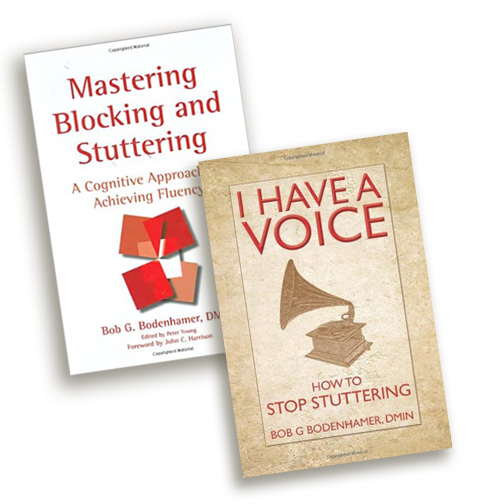
Dr. Bob G Bodenhamer is a clinician and a certified trainer of Neurolinguistic Processing, or NLP, who applies its principles to the treatment of stuttering. His books on the subject are I Have a Voice: How to Stop Stuttering and Mastering Blocking and Stuttering: A Cognitive Approach to Fluency.
The Power of Positivity
NLP is a type of psychotherapy developed in the 1970s by psychologists who studied the communication and social skills of highly successful people, and sought to teach these skills to others. It uses positive thinking, mental exercises, self-assertiveness and heightened awareness techniques, among other things, to help people achieve success and fulfillment in life and eliminate phobias and anxiety. Cognitive therapy is used by many speech pathologists today, but Bodenhamer's methods use NLP exclusively to treat stuttering. The process is outlined in two books, that are aimed at different audiences; Mastering Blocking and Stuttering, (2004), features treatment methods for a pathologist to guide a client, whereas I Have a Voice (2011) is more for the PWS who is self-directing his or her own therapy. Bob Bodenhamer himself does not stutter and is not a speech pathologist.
Controlling Mental/Emotional States
To Bodenhamer, stuttering or blocking during speech is a form of panic attack, brought on by an agitated emotional state and negative thinking patterns with their roots in childhood experiences. People who stutter suffer from the same things common to those who experience phobias and anxieties; they anticipate negative outcomes and exaggerate other people’s judgements of them, they spend time “mind-reading” and predicting the future and, in a sense, doom themselves to failure. Because many stutterers are capable of talking without stuttering at certain times (e.g. when alone), it follows, that the mental/emotional states that enable fluency then are attainable in other situations. It is a matter of being able to allow the fluent state to occur. Performance – in anything – is influenced by our emotions, and emotions are created by our thoughts. Therefore, the introduction of new constructive thought patterns can change the outcome of our lives. The goal is to modify thinking processes in order to create a calmer emotional state that enables fluency, and to make this calm state accessible at any time. This is done through exercises that encourage the patient to distance him/herself from negative emotions and thoughts, to access “resourceful” states to combat the fear of blocking.
The Cognitive Aspect
According to the book, practicing these methods and heightening mental discipline and awareness can help a stutterer achieve fluency. The premise that stuttering has emotional and cognitive aspects is not new, in fact cognitive behaviour therapy is a tool of many speech therapists, but their main focus is on the physical nature of the impetiment. But according to Bodenhamer, blocking and stuttering can be eliminated purely by focusing on emotional and mental mindsets of the patient, and helping him or her to overcome debilitating belief systems and fears. This is accomplished by teaching mental reframing techniques, changing points of view, and creating positive mental images to defeat images of fear and failure.
Bodenhamer and Harrison have been criticized for overstating the effectiveness of their treatment, which involves the persistent practicing of techniques, a time-consuming regimen which in that sense is not much different from mainstream treatment. The difference is, accepted treatments such as PFSP have been proven through research to alleviate stuttering and there is stronger evidence for their effectiveness. Nevertheless, the emphasis on positive thinking, creative thought experiments and mental discipline is hardly objectionable; everyone can all benefit from more focused, positive thinking.
Testimonials can carry a lot of weight, and some people have claimed to have become fluent using his methods, including John C Harrison, author of Redefining Stuttering, and a mysterious, secretive figure named Linda Rounds, the PWS Bodenhamer met initially who inspired him to treat people who stutter. They both write testimonials in Mastering Blocking and Stuttering.
Both books are available at Amazon and Chapters.
